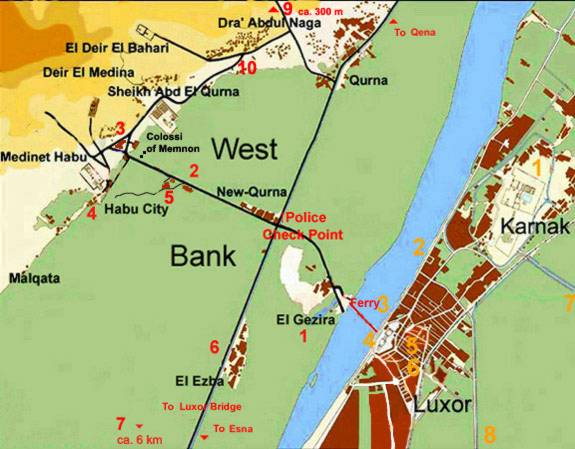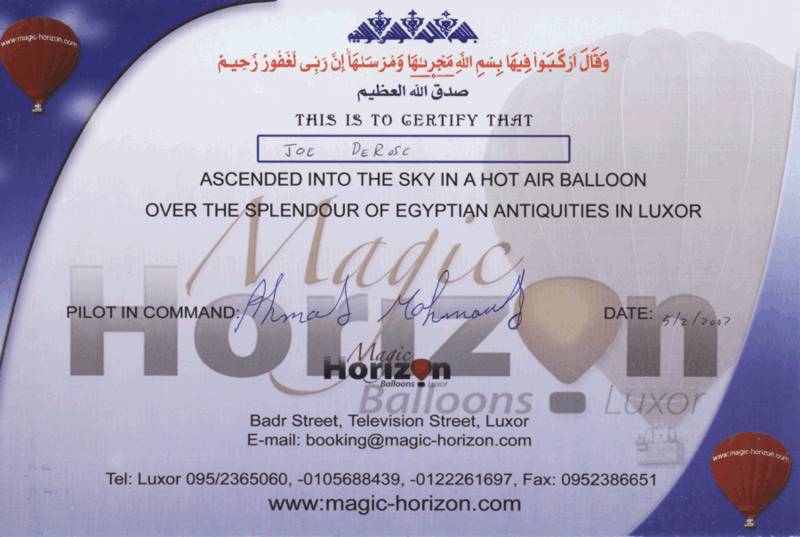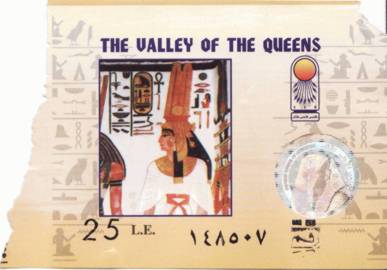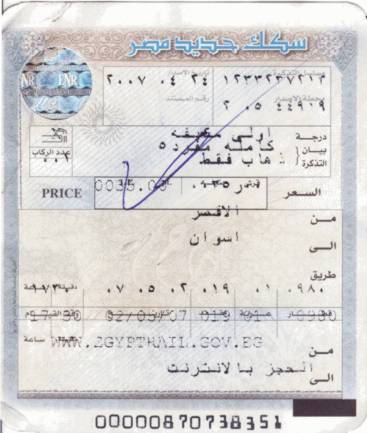يوم الأربعا، ١٤ ربيع الثاني ١٤٢٨
| 20 | ٢ | |||
| 21 | ٣ | |||
| 22 | ٤ | |||
| 23 | ٥ | |||
| 24 | ٦ | |||
| 25 | ٧ | |||
| 26 | ٨ | |||
| 27 | ٩ | |||
| 28 | ١٠ | |||
| 29 | ١١ | |||
| 30 | ١٢ | |||
| 1 | ١٣ | |||
| 2 | ● | ١٤ | ||
| 3 | ١٥ | |||
| 4 | ١٦ | |||
| 5 | ١٧ | |||
| 6 | ١٨ | |||
| The West Bank by Balloon |
 |
West Bank Sites |
We woke up at 4:00 AM in preparation for a sunrise balloon ride. Our taxi driver met us right on schedule and took us down the street where we were offered tea at a café (gratis, which was unexpected) while we waited for the rest of the passengers to arrive on a boat from the East Bank. Then we went down the road to a place where several balloons were in various states of inflation.
|
|
Immediately after takeoff, we found ourselves with spectacular views in both directions: To the west we looked out over
|
Deir al-Bahri, with the
Mortuary Temple of Hatshepsut: |
A highlight of the trip for me was flying over the Colossi of Memnon, the sole remains of the mortuary temple of Amenhotep III.
|
|
And to round out our tour of the ancient tombs, we crested over
|
Deir al-Medina: |
And finally, we flew over some of fields and farms of the West Bank:
|
|
But also among the sites we flew over were those of abject poverty: people sleeping on the roofs of their homes in the hope of fighting the draining heat; houses without roofs (as it common in this rain-free environment) allowing us to peer down and see the dirt floors and scant possessions; and at the landing site, children pressing their faces against the van and reaching through the windows in the hope that we would take pity and offer a few piasters, only to be waved away repeatedly by the balloon operators.
I've always wanted to fly in a balloon, and the ancient sites of Luxor provided a wonderful backdrop. Even so, when I filled out the (mandatory) comment card, I found myself unable to check "Yes" for "Would you recommend it to others?" – because of my unease over the poverty, and especially over our luxurious intrusion into its airspace and its land.
So at the end of the day I got a crappy T-shirt with a neckline too small for my head, a piece of paper that will silence my critics if I am ever called upon to prove that I am a certified balloon passenger, and a look into my soul and good fortune that is still eating at me as I write this page two months after the vacation ended. This morning jaunt was the single greatest expense of the trip, at LE 1,490.00 ($262.56) for the two of us; I'd be inclined to pay it again to purge from my memory the fact that I landed in a field of beggar children and turned my back on them.
 |
Balloon Certificate |
The balloon certificate is an interesting cultural icon, at least: The English text is matter-of-fact and balloon-oriented, but the Arabic text is religious in nature: The highly stylized blue line at the top, where all the words look like triangles, reads,
| The West Bank by Taxi |
After the balloon ride, we slept a couple of hours in the hotel. Then when we (mistakenly) thought we could face the heat again, we took a taxi around the West Bank to have lunch and see some of the tombs. At a restaurant near the Deir al-Medina, I again had
|
The kafta was good enough I suppose – but here's what I don't get about the cuisine and culture of the Middle East: Faced with days so blazingly hot that merely drawing a breath is an effort, the people here of both genders dress in many stuffy layers of clothes (the men, I know, wear at least three layers), smoke constantly, eat heavy meals, cover their food with salt, drink blisteringly hot tea, and serve that tea in glasses without handles. If it were a culture of asceticism or masochism, I would understand – but it's not. Perhaps the style of dress can be understood in the context of modesty, upon which Islam places an emphasis. But there is nothing in their faith that would preclude sitting down with some iced tea and a caprese salad.
First we went to Deir al-Medina, where we saw the most spectacular tombs of the day – although they were of artisans rather than royalty – with vivid art on the walls and ceilings. Then, on the advice of the taxi driver, we went to the Valley of the Queens, as much of the Valley of the Kings was closed. This had a couple of nice tombs as well, but nothing like Deir al-Medina. Pictures were forbidden at both places, and the Lonely Planet book warned that one's memory card would be confiscated if this regulation were ignored, which scared me so much that I didn't even photograph the exteriors; all I can show you is scans of my tickets.
|
|
This portion of the trip was grueling for both of us, as even the shortest walk involved mustering of resources both external (water) and internal (the will to face the burning sun). Back at the hotel, we learned why the environment was so fatiguing: Upper Egypt (the southern part) was experiencing a spring heat wave that brought temperatures into the heat-of-summer neighborhood: On this day in Luxor, the temperature was the highest I have ever experienced outdoors: 44°C/111°F.
 Billy rested at the Amon Hotel. But I knew I needed more money to check out – so while he slept I took the ferry over to the East Bank and back, because of the lack of ATMs on the West Bank. On the trip over I stood by, and chatted with, a couple from Shanghai. Curious about the trend in Chinese tourism away from organized tours and toward independent traveling, I asked if they were part of a larger group. One of them said, "No. We've got our Lonely Planet!"
Billy rested at the Amon Hotel. But I knew I needed more money to check out – so while he slept I took the ferry over to the East Bank and back, because of the lack of ATMs on the West Bank. On the trip over I stood by, and chatted with, a couple from Shanghai. Curious about the trend in Chinese tourism away from organized tours and toward independent traveling, I asked if they were part of a larger group. One of them said, "No. We've got our Lonely Planet!"
Back in the hotel, Billy and I packed and confessed to each other that we're glad the trip is drawing to a close. In planning we worried that we should have scheduled a longer trip or allowed more time in fewer places. But now it is evident that neither fear was on target: Seventeen days is too long, and I may try to limit future travels to a week or so – especially to culturally challenging parts of the world. And with the sole exception of Jerusalem, there is not a single place we have gone where we have thought the time planned was inadequate.
| The Nile by Train |
Most people love Luxor, but Billy and I didn't, and I struggled at the time to understand why. A lot of it, I understand in retrospect, was simply the heat: We were unaccustomed to it, and it was unseasonably warm for early May so even the people in Luxor hadn't yet had time to adjust; everyone's mood was affected. But there was an attitude of humorlessness in Luxor that I struggled to understand. At the time, I associated with religious devotion (which is highly evident in Luxor), but later, people in other cities offered a different view that it was simply raw capitalism: I'll talk about the lack of smiling in a couple of paragraphs – but when I told the same story to a man in Aswan, he said the people in Luxor "only smile when they make money." And I made an immature mistake in thinking I was describing Egypt as a whole when I put down my observations on Luxor, our first of three cities in Egypt. Anyway, with those caveats, here's what I wrote while still on the trip, preparing the first draft of this report:
Really, I consider myself highly privileged to have come to Egypt, but it is a draining place to be. And it's not just me: Egypt seems to have defeated the Egyptians as well.
Interestingly, the few occasions when we saw people smiling or laughing, it was women; this realization, however, took me by surprise because of the conservatism of the environment in general, and of women's dress in particular. In the (ill-informed) opinion of most Westerners, the
EN hijab AR حجاب is am emblem of oppression of women. I am familiar enough with Islam to know that the prevalence of the hijab and the status of women do not correlate directly one with the other, and I know strong Muslim women at home, some of whom choose to wear the hijab. But I'll confess to some skepticism about the status of women in Luxor: First, the place is extremely religious – more so than I've seen in even the most backwater fundy towns in the South – with prayers written graffito style on walls everywhere, religious music blaring from taxi radios, and the call to prayer being used as a ringtone by about half the cell phones in the city. Second, all of the local women wore hijabs; while I saw few veils, and never saw a burqa, the ubiquity of the hijab led me to wonder about the degree of free expression available to women in Luxor.Yet, we certainly saw women asserting themselves, in manners both friendly and unfriendly, with men. Whatever constraints exist do not mandate complete submission.
But back to my point about smiling and women: All of these impressions may or may not have been accurate, but the fact remains that on each of the few occasions in Luxor in which we saw someone laughing or smiling genuinely, it was a woman.
Even so, it was a rarity: Everywhere in Luxor, people's faces seemed to mask a sullen dread. And I have to acknowledge that we didn't add much to change this fact. I am very pleased to have visited Luxor, but I smiled when I left it.
But not until I got off the train. We had arranged for first-class passage on the 5:35 PM train. It was nearly an hour late, which was not a huge problem except that the blazing sun drained our strength even as we sat on the station bench waiting. On the train, the first class cabin was old and shabby (but not enough so to be charming), was strewn with food containers left by the people coming from Cairo, and had an air conditioning system that gave us only sporadic comfort. To add insult to injury, when I walked the length of the train to the cafeteria, I found second class cabins that were new, clean, and cold.
|
|
Aswan made a good first impression, though: Here the fountains worked (unlike in Luxor), many women went without the hijab (so it appeared more a choice than a requirement), and people smiled as they said "Welcome to Aswan."
We had tried to make reservations for Abu Simbel before starting the trip, but the hotel advised that we should wait until we got to Aswan, and said that it shouldn't be a problem even though we were scheduled on the evening train and wanted to embark on the early morning tour only a few hours later. In the only scheduling hiccup, we were informed at arrival that Abu Simbel could not be scheduled so late, and we missed our chance to see it.
Even so, the Keylany Hotel was a nice choice, with a beautiful rooftop deck. The bidet attachment on the toilet here was a bit off-putting in our cultural unfamiliarity: It was the same kind of contraption that we use in America as a salad sprayer. It became even more off-putting when it developed a leak as we slept; Billy woke me at 3:30 AM saying the shower was on (he was groggy) and the floor was flooded. The hotel moved us to an adjacent empty room just as Billy thought he heard cussing from the floor below us.
|
|
This was, it should be noted, the least expensive hotel I have ever stayed in – possibly even going back to my childhood – at LE 44.00 ($7.75) per person. (They required an advance deposit by credit card of $1.55.)
We really liked the Keylany, but were endlessly amused by its brutally honest self-awareness. The hotel's website declares, "We cannot say we are the best, but we are a very suitable hotel ..." And the hotel services include (for female guests only) threading, a form of depilitation about which the Keylany declares, "Facial hair is removed by two pieces of strings that pick only the hair, It’s a fairly painful process ..."
| Main | ||||||||
| 20 | κʹ | |||||||
| 21 | καʹ | |||||||
| 22 | κβʹ | |||||||
| 23 | κγʹ | |||||||
| 24 | κδʹ | |||||||
| 25 | κεʹ | |||||||
| 26 | ח׳ | |||||||
| 27 | ט׳ | |||||||
| 28 | ١٠ | |||||||
| 29 | ١١ | |||||||
| 30 | ١٢ | |||||||
| 1 | Previous | الأخير | ١٣ | |||||
| 2 | ١٤ | |||||||
| 3 | Next | التالي | ١٥ | |||||
| 4 | ١٦ | |||||||
| 5 | ١٧ | |||||||
| 6 | ١٨ | |||||||


